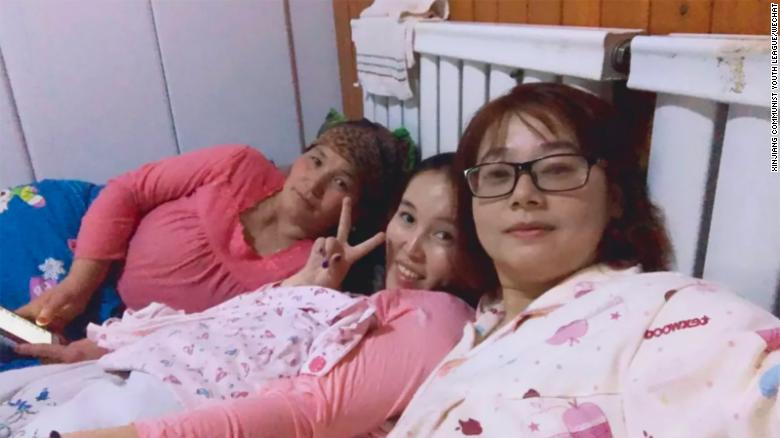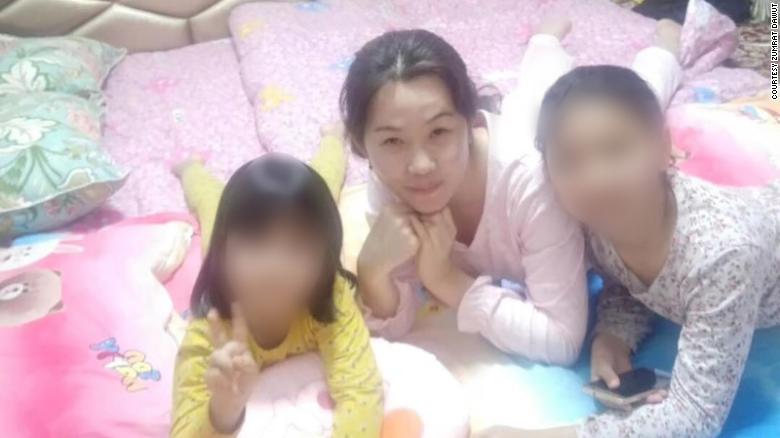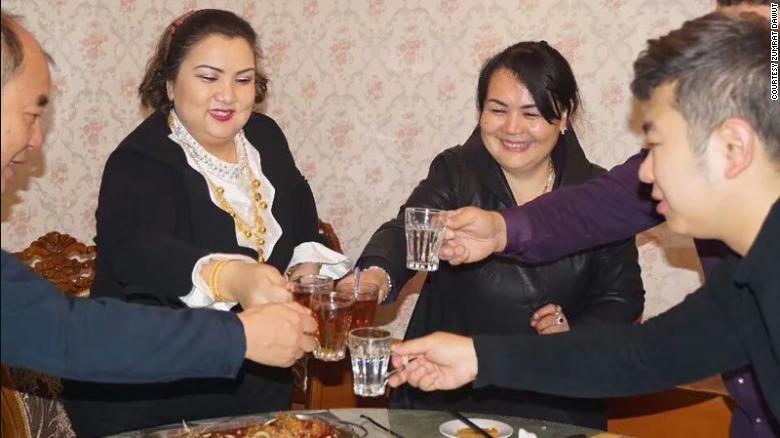The Chinese policy that makes Uyghurs feel like hostages in their own homes
May 08, 2021A woman raises a toast in a photo that appears to show four friends enjoying dinner together. The reality couldn’t be more different.
The woman in the white ruffled shirt is Zumrat Dawut, an ethnic Uyghur from Urumqi, who fled China in 2019 to escape the alleged repression of Muslim minorities in Xinjiang.
Her four “guests” are Chinese government cadres who lived in her home for 10 days every month for two years before her family fled, she said.
“We must pretend that we are happy,” Dawut explained from Washington DC, where she lives in exile.
“If we do not then the government will conclude that we are against their ‘relatives’ policy.”
China introduced its relatives policy – part of the “ethnic unity campaign” – in 2016, ostensibly to promote national harmony. Since then, more than 1.1 million cadres have visited the homes of 1.6 million people of different ethnic groups in Xinjiang, according to a “fact check” published by Chinese state news agency Xinhua in February.
…
Rosy images of the home stay program heavily promoted in Chinese state media depict the policy as a blend of community service and education.
Videos and social media posts on official accounts show host families and cadres warmly greeting each other as “relatives,” cooking meals together, and even sharing beds at night.
But, according to several people who fled the Xinjiang region, when it comes to the home stay program, the hosts are actually hostages.
Under the home stay policy, cadres are sent to live, work and sleep with families in Xinjiang for several days at a time, every one or two months, former residents said.
Because each person in Dawut’s house was assigned an official “relative,” including children, she said she had to host four officials in her home each visit. “Because my husband is a foreign national, they did not force him to pair up with a relative, but me and three of our children we all had one relative each,” she said.
Dawut said her assigned cadre followed her around the house, asking questions, and taking notes that she feared could see her re-imprisoned in China’s vast network of detention centers.
She was so scared her children might inadvertently say something wrong that she coached them to give the “right” answers. “If they ask you, ‘does your mother pray?’ Say no. ‘Does your father pray? Say no. ‘Do you believe in Islam? Do you have Quran? Do you have a praying rug?’ Say no to them,” she said.
…
A former teacher in an internment camp, Qelbinur Sidik, said she was ordered to host her first cadre in May 2017.
The “relative” was her husband’s boss at a state-owned factory, she said. Initially, he came once every three months, but by the end of that year, he stayed at her house for one week each month.
“He wanted me to sit together with him, drink wine with him. I begged him not to force me,” she said from the Netherlands.
“When he was drunk, he wanted me to sleep with him.”
Human Rights Watch has previously documented cases of male cadres being sent to stay at homes occupied by women and children, an arrangement that makes them vulnerable to sexual violence.
Sidik says the man hugged her, but he didn’t push it any further.
She thinks that’s because her husband was there, though she added that many Uyghur men had been detained, leaving women at home alone to deal with the stranger in their house.
In December 2017, the initiative ramped up with “Becoming a relative week,” when cadres of all levels and departments were dispatched to Xinjiang to live, work and learn “with the masses,” according to state media.
It promoted the program with two numerical slogans: the “four togethers” – which are “eat together, live together, study together, work together,” and the “three sends,” under which cadres “send laws, send policies, send warmth.”
That month, cadres took selfies with smiling families which were later posted online. One image shows two women in bed with a female host. “Communist Youth league cadres from Tekes county live with relatives in the warm room, taking a selfie before sleep,” reads the caption.
In a report aired on state television in January 2018, a woman named Aymgul Hesan thanks her official guest saying: “I hope we can be ‘relatives’ for the rest of our lives.’“
Months later, in a separate TV report, an official named He Jingjing is filmed showing a little boy how to wash his hands.
“I taught the kids to wash their face and brush their teeth,” she explains. “I brought the concept of modern life here, so they can live a better and more civilized life.”
Timothy Grose, professor of China Studies and expert in ethnic policy at Rose-Hulman Institute of Technology, said official documents suggest cadres aren’t only there to teach the locals to be “more civilized.”
“When you go through official documents, it becomes ever so clear that these are actually programs for human intelligence gathering and surveillance,” he said.


